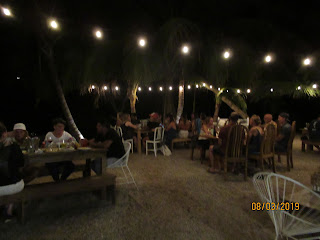The morning after the Big Bang we headed for Nosara, a little beach town on the western coast. We had a 3-hour ride over mostly bumpy, dusty roads. The roads through the larger towns were mostly paved and so were occasional patches out in the country, mostly, it seemed, in front of impressive-looking houses. On the way, we passed this man herding cattle.
We had a wonderfully relaxing time in Nosara. We rented a house owned by an American--probably an aging surfer--who had bought the house years ago as an investment. He was now ready to move on to something else, so the house was for sale.
The house came with a pool. Although David and Simone braved the ocean, the older folks waded in the ocean but swam in the pool that came with the house.
Barbara made breakfast every morning,
but we had lunch and dinner at local restaurants, all of them very good.
We were charmed by what we took to be "our" resident cat. He darted into the house whenever he had the chance. Simone and David bought food for him, which he chowed down voraciously. The landlord later informed us that he actually belonged to a neighbor.
On our next-to-the-last evening, we celebrated Ron's birthday by having dinner in the festive outdoor garden of a hotel. It was a warm, starlit night within sight of the Pacific. A slender crescent moon appeared in the sky, but it did not look like the upright crescent moon seen back home on outhouse doors. This crescent moon looked more like a bowl. We called it the "smiley-face" moon.
On our last full day in Nosara, we went to a nearby hotel for a self-guided nature walk. After descending a newly-built stairway of over 100 steps, we walked along a trail for awhile and soon decided we must have missed a turnoff. The signs were confusing. The older folks decided to return to the hotel. David and Simone opted to continue.
After ascending the 100+ steps, we found a table on a breezy 0cean-view patio and ordered drinks. After awhile, we began to be a little concerned about David and Simone. Why weren't they back? We waited some more, chatted some more, drank some more, quietly fretted and still they didn't appear. Just as Barbara was about to inform the woman at the reception desk that they were lost, David and Simone came crawling up the stairs, sweaty and muddy. The trail was poorly marked. They'd gotten lost. After wandering forlornly in the wilderness, they found a log stretched across a river and shinnied across that on their butts, trying not to think of crocodiles.
We took little 3-wheel taxis back to the house. Ours got a flat tire. Fortunately, we were fairly close to the house when the tire gave out.
Barbara made breakfast every morning,
but we had lunch and dinner at local restaurants, all of them very good.
We were charmed by what we took to be "our" resident cat. He darted into the house whenever he had the chance. Simone and David bought food for him, which he chowed down voraciously. The landlord later informed us that he actually belonged to a neighbor.
On our next-to-the-last evening, we celebrated Ron's birthday by having dinner in the festive outdoor garden of a hotel. It was a warm, starlit night within sight of the Pacific. A slender crescent moon appeared in the sky, but it did not look like the upright crescent moon seen back home on outhouse doors. This crescent moon looked more like a bowl. We called it the "smiley-face" moon.
On our last full day in Nosara, we went to a nearby hotel for a self-guided nature walk. After descending a newly-built stairway of over 100 steps, we walked along a trail for awhile and soon decided we must have missed a turnoff. The signs were confusing. The older folks decided to return to the hotel. David and Simone opted to continue.
After ascending the 100+ steps, we found a table on a breezy 0cean-view patio and ordered drinks. After awhile, we began to be a little concerned about David and Simone. Why weren't they back? We waited some more, chatted some more, drank some more, quietly fretted and still they didn't appear. Just as Barbara was about to inform the woman at the reception desk that they were lost, David and Simone came crawling up the stairs, sweaty and muddy. The trail was poorly marked. They'd gotten lost. After wandering forlornly in the wilderness, they found a log stretched across a river and shinnied across that on their butts, trying not to think of crocodiles.
Simone explains how they found their way out of the jungle.
We took little 3-wheel taxis back to the house. Ours got a flat tire. Fortunately, we were fairly close to the house when the tire gave out.
The next morning, our van took us back to San Jose, a ride of about 5 hours. We spent our final night at the Hotel Buena Vista. The hotel van took us to the airport early Monday morning. We said good bye to each other there, as each couple had a different departure time. Barbara and Ron were headed for Chicago; David and Simone, to Los Angeles, and Phil and I to Baltimore.
Houston was a nightmare. Only three officials were available to check the passports of at least 500 returning, travel-worn, tax-paying citizens. Some people, pleading the need to make a connecting flight in 20 minutes, jumped ahead in line. Others just weaseled under the cordon because they felt entitled. Tempers flared. Babies cried. Bored officials yawned.
We reached Baltimore after midnight, watched hopefully for our suitcase to arrive on the carousel, filed a missing suitcase report, found our car without too much trouble in the jam-packed parking lot, went home, fell into our welcoming bed. What a wonderful trip!



















